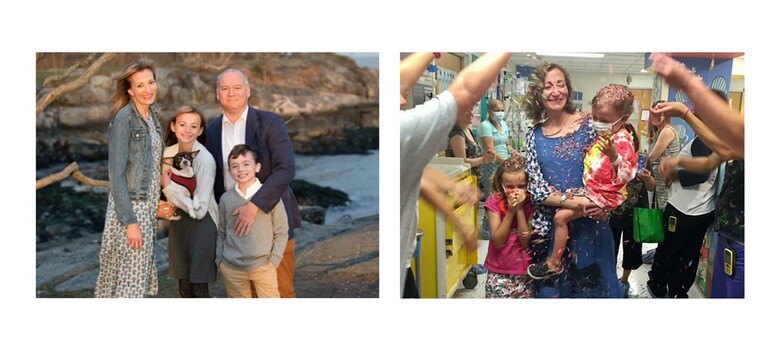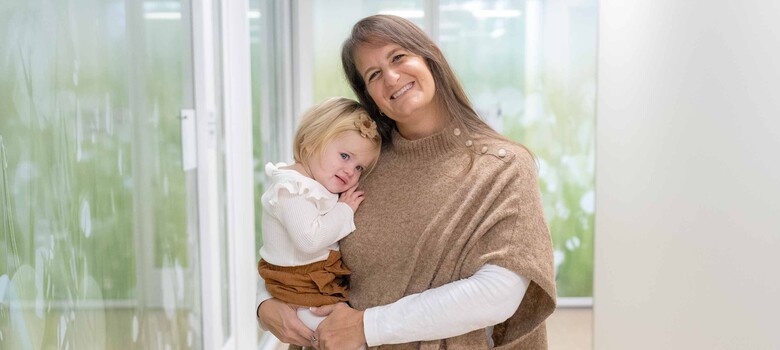A Stem Cell Transplant at Duke Changes Future for Baby with Life-Threatening Genetic Disease

When Everett McNaughton was born, he loved to eat and cuddle, said his mother, Morgan McNaughton. No one suspected that he had a rare genetic disorder called severe combined immunodeficiency (SCID) -- also known as bubble boy syndrome. But that’s what a routine newborn screening test uncovered. Everett was born without an immune system to protect him from serious and potentially life-threatening infections. Without quick intervention, his future was bleak. Thanks to swift action by his parents, the expertise of Duke Health pediatric stem cell transplant team, and the gift of bone marrow from his older brother, Everett is now six months old and thriving.
An Early Diagnosis Provides Hope
The goal of routine newborn screening is to catch serious diseases early. For Everett, being diagnosed with SCID soon after his birth in August 2021 meant that his condition could be treated. “He was fortunate,” said Vinod Prasad, MD, MBBS, a pediatric bone marrow transplant specialist at Duke. “Often children are diagnosed later when they have already suffered from serious infections and possibly organ damage. Many do not live to see their first birthday.”
A Race Against the Clock
Because Everett’s family learned of his condition early, they were able to take immediate measures, isolating themselves in their home and doing everything they could to keep Everett infection-free. They quickly learned that a stem cell transplant, the only known cure for SCID, was his only hope. A stem cell transplant -- also called a bone marrow transplant -- takes normal infection-fighting cells from a donor’s bone marrow and introduces them into a recipient’s body.
When the McNaughtons reached out to Duke for help, the pediatric stem cell transplant team sprang into action. The family knew that time was of the essence. When asked how soon they could get to Duke from their home in in Virginia Beach, VA, McNaughton said, “We can leave right now.”
Against the Odds, A Perfect Match
They arrived at Duke on August 30, 2021, the day that Everett’s older brother Fergus turned three. Donovan, Everett’s father, and Lily, his sister, came too. The entire family was tested to determine if one of them could be a donor for Everett’s stem cell transplant. There was a one-in-four chance that Fergus or Lily would be a full match. “When children have a genetic disease like SCID, we have to make sure that the sibling is not only a match, but is not affected by the disease,” explained Dr. Prasad. When the results came back, the McNaughtons and Everett’s doctors breathed a sigh of relief. Fergus was negative for SCID and a perfect match for his baby brother.
A Delicate Balance
Before Everett could have his transplant, his body needed to be prepared to accept healthy stem cells from his brother. This meant the two-month-old needed chemotherapy to make room in his bone marrow for new cells to grow. The transplant team’s goal was to balance the amount of chemotherapy Everett received -- enough to ensure a successful transplant but not so much as to cause short- and long-term side effects, said Dr. Prasad.
“They did it perfectly,” said McNaughton. “I was prepared to see Everett really suffer from chemo, but I basically had a fussy baby. A week or two later he was a baby who was ready to play again.”
Looking Forward After Transplant
After Everett recovered from chemotherapy, Fergus’ healthy stem cells were infused into his body. Today, almost 100 days after the procedure, he is on the road to a cure, said Dr. Prasad. Everett and his mother will remain at Duke until doctors are sure that his immune system is fully functional, but McNaughton is already looking toward the future. “I really look forward to watching the boys get older and seeing their bond. Our experience at Duke has given me a new sense of gratitude and joy that I want to bring into our lives moving forward.”



